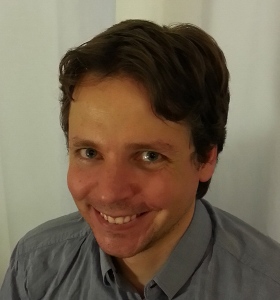Jun 5 2014
For his excellent doctoral thesis, the young physicist Manuel Endres has been awarded with the Otto Hahn Medal 2013. Since 1978 the Max Planck Society presents this honour annually to junior scientists for groundbreaking scientific achievements connected to their doctoral thesis. The award is intended to encourage highly talented people to decide for a career in fundamental research.
Dr Endres receives the medal, endowed with prize money, for his new technique in detecting single atoms in optical lattices, developed in the Quantum Many-Body Systems Division of Prof. Immanuel Bloch at the Max Planck Institute of Quantum Optics. Having finished his thesis in March 2013 Manuel Endres started to treat these topics from a more theoretical point of view, working in the Theory Division of Prof. Ignacio Cirac.
 Manuel Endres
Manuel Endres
Manuel Endres (Foto: MPQ), born in Würzburg (Germany), began his education with the study of Computer Science at the University of Applied Sciences Würzburg. After his pre-diploma, he went to the Philipps-Universität Marburg to study physics. There, he received his physics diploma in 2008. His diploma thesis was supervised by Prof. Immanuel Bloch (at that time Chair of Experimental Physics at the Johannes-Gutenberg-Universität Mainz). In 2008, Manuel Endres started to work on his doctoral thesis in the Quantum Many-Body Systems Division of Prof. Bloch at MPQ, completing in March 2013 with summa cum laude. With the support of Prof. Stefan Kuhr (now at the University of Strathclyde, Scotland) he was able to develop a novel technique for the detection of single atoms in optical lattices.
In the past years, ultracold quantum gases have proven to be excellent models of strongly interacting many-body systems, from extended stellar systems to high-tech materials. The new method aims at understanding such complex systems at the level of individual particles. A high-resolution objective collects the fluorescence light and yields in-situ snapshots of the quantum gas, which allows for a single-site-resolved reconstruction of the atomic distribution. A series of such snap shots provides information on the particle correlations. For the first time, even non-local correlations between atoms on different lattice sites can be experimentally detected. In addition, the highly sensitive technique could be used to detect, for the first time, an ‘Higgs’ amplitude mode close to a low-dimensional quantum phase transition.
“There are, however, limitations to the method.” says Manuel Endres. “We are imaging the density including all fluctuations and correlations but do not have direct access to coherence and entanglement properties of many-body states using this technique.” In his theoretical work, he is developing schemes to overcome these limitations. “I would really like to understand what is going on in these complex systems; in particular: Which information can we actually obtain experimentally? And, how much control can we possibly achieve at the microscopic level?” Endres concludes.
During his short career, Manuel Endres has already received quite a lot of recognition. From November 2003 until March 2008, Manuel Endres received a grant from the The German National Merit Foundation. The eminent scientific value of his thesis is further underlined by two other awards: last year Manuel Endres was elected by the Münchner Universitätsgesellschaft for the Promotionspreis, in addition, his thesis “Probing correlated quantum many-body systems at the single-particle level” has been published as a book by the Springer-Verlag. Dr Endres will be presented with the Otto Hahn Medal on the occasion of the General Meeting of the Max Planck Society in Munich on June 4th, 2014. Olivia Meyer-Streng
Contact:
Dr. Manuel Endres
Max Planck Institute of Quantum Optics
Hans-Kopfermann-Straße. 1
85748 Garching, Germany
Phone: +49 (0)89 / 32 905 -239
E-mail: [email protected]
Dr. Olivia Meyer-Streng
Press and Public Relations
Max Planck Institute of Quantum Otics
85748 Garching, Germany
Phone: +49 (0)89 / 32 905 -213
E-mail: [email protected]